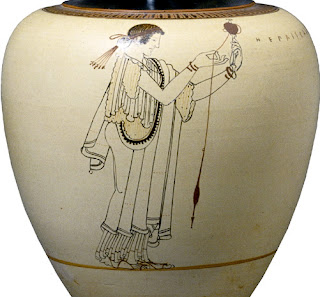Unlike men, women married between the ages of 12 and 16. The younger they married was directly related to how wealthy their families were. Once a girl was married her family paid the man a dowry and sent the girl away to move into the mans household. In most cases there was no wedding ceremony or celebration, it was as simple as a business transaction. Only the wealthy could afford a ceremony in which the veiled bride rode in a chariot to the house of her future husband.
In todays society it is normal for people to have an extravagant wedding and to splurge on a cinderella-like wedding gown but back then marriage was based on the compatibility of families rather than the two people. This idea seems foreign to many people in todays culture. We are programmed to believe that marriage is based on love and devotion while in reality most marriages end in divorce now. Keep in mind; divorce was a lot less common in Ancient Greece.
http://www.bbc.co.uk/schools/primaryhistory/ancient_greeks/home_life/
This is an image of women transporting water back to their houses in large jars. This was also a common household chore.
After marriage the girls job was to get pregnant, and fast. For many years she is expected to continue to have children. While pregnant, women were expected to maintain their households with the help of slaves. These slaves would take care of newborns, protect the house and even educate the children if they were literate. The mother did many of these tasks as well.
Today it is common for a mother to hire a housekeeper, babysitter or even tutor. Comparing the two shows many similarities. A big difference between women in both societies is that women in ancient Greece had many restrictions on where they could go. During the day women were only allowed to go see other women with the knowledge of their husbands. Their main job was to take care of the kids and maintain the household.
http://www.bbc.co.uk/schools/primaryhistory/ancient_greeks/home_life/
Spinning was something most women were expected to do for long hours of the day. This was a craft taught from mothers to daughters.
Most of the time girls were taught their education at home while the boys would go out with their fathers to learn the family trade, whether it be in the field, on the farm or in a shop. While many families had slaves for the hard labor, some families relied on the men and boys in the family to keep the business going. Some families were so rich they were able to afford 50 or more slaves to run the house and farm.
In today's culture it is different in many ways. Obviously girls and boys attend the same schools for the most part, with the exception of private schools, and they also are both treated in a way that shows they are of equal value. In Ancient Greece little boys were prized more than girls because they had more rights and power in society. In our culture both girls and boys are given the means to reach the same potential.
Sources:
http://www.ancientgreece.co.uk/
http://www.ghsd-curriculum.com/inquiry/projects/greece/research_text/greek_life.html
http://www.bbc.co.uk/schools/primaryhistory/ancient_greeks/home_life/
Sources:
http://www.ancientgreece.co.uk/
http://www.ghsd-curriculum.com/inquiry/projects/greece/research_text/greek_life.html
http://www.bbc.co.uk/schools/primaryhistory/ancient_greeks/home_life/


No comments:
Post a Comment